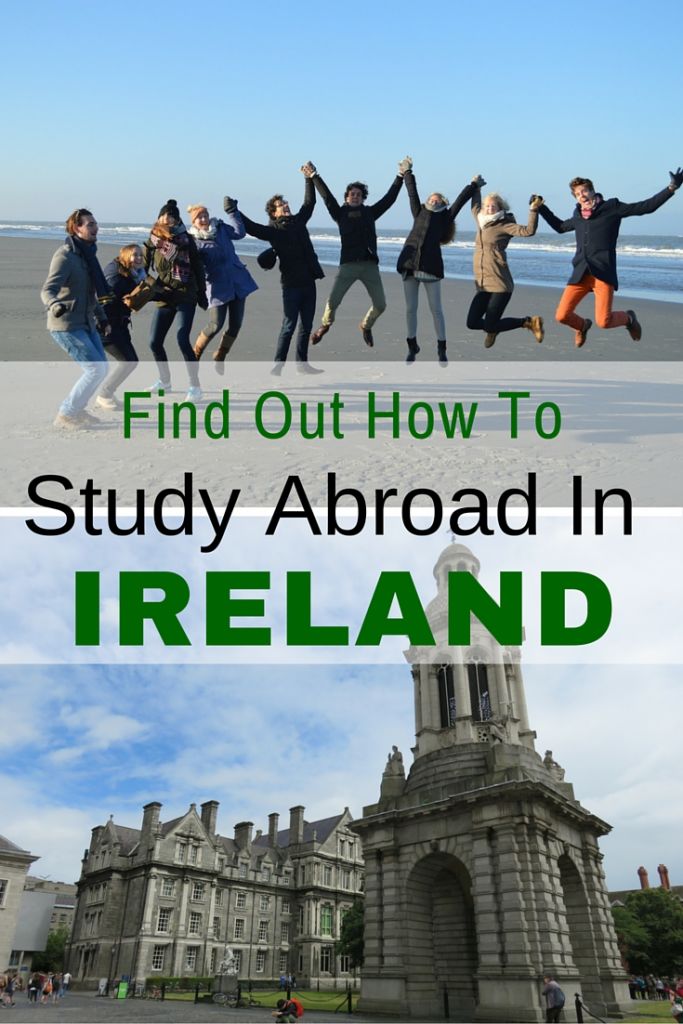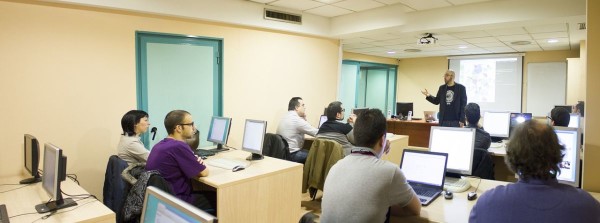This post may contain affiliate links. If you make a purchase through a link, I may receive a small commission, at no cost to you. These commissions help keep this website up and running, and I thank you for your support. Read my full disclosure here.

The Irish higher education system offers a wide range of internationally recognised courses and, as a result, attracts a number of students from abroad. Ireland has nine universities in the overall Times Higher Education World University Rankings. The highest-ranking university in Ireland is Trinity College Dublin, which is ranked at number 164.
- Fees
- Scholarships
- English Language Requirements
- Undergraduate Study in Ireland
- Postgraduate Study in Ireland
- Helpful Tips for Studying in Ireland
Fees
Irish, EU/EEA and Swiss Students
Under the Free Fees Initiative University Education in Ireland is free, but only for students who:
- Have Irish or EU nationality, or is a national of a member country of the European Economic Area or Switzerland, or has been granted official refugee status.
- Have been a resident in Ireland or an EU Member State for at least three of the five years preceding entry to the course.
- Must not be undertaking a second undergraduate course.
Although there are no tuition fees for eligible Irish and EU students, there are still the student service fees that need to be paid on registration in order to cover the cost of examinations, insurance, and registration.
Students from Other Countries
If you don’t qualify for the Free Fees Initiative, then studying in Ireland is still an attractive option because it offers reasonably priced higher education. Consequently, Ireland attracts a number of international students, particularly Americans, who are enticed by lower fees (compared to their own country) and the exciting experience of living abroad.
Learn more about the immigration requirements for non Irish, EU/EEA and Swiss National Students.
Scholarships
For a list of the scholarships available for international students, see the Education in Ireland website.
English Language Requirements
As courses are taught in English, you must be proficient in English in order to be accepted. However, there are many private English language training schools nationwide which offer both short and long-term courses. Some of the universities and colleges also provide English language training courses for those aiming to study with them.
Undergraduate Study in Ireland
Irish and EU Students need to apply to enter an Irish Higher Education Institution (HEI) through the Central Applications Office (CAO) rather than the individual institution.
For Irish students, the CAO provides a handbook to students via schools in September which provides information on courses, fees, deadlines etc… EU students can access this CAO handbook online.
You must submit your application to study either online through the CAO website or by post.
For non-EU students, you will need to contact the International Office of the institution that you wish to attend.
Entry Requirements
The entry requirements vary from year to year, depending on the number of places available and the number of applicants. Entry into the more popular courses can be competitive.
Irish students compete for entry based on results achieved in their Leaving Certificate Examination. Students are graded on their six best subject scores.
The International Baccalaureate (IB) Diploma is also accepted as meeting the minimum entry requirement for higher education programmes, as all applications are assessed individually. But the Diploma does not guarantee admission and some institutions may stipulate additional requirements.
Medicine
If you want to apply to study medicine in Ireland, you will need to undertake the Health Professions Admissions Test (HPAT). The score achieved in this examination will be added to your Leaving Certificate points to create a total point’s score. Students must achieve minimum points, which can change year to year, and also meet the matriculation requirements of the Medical School applied to.
Non-EU applicants will need to contact the International Office of the institution they wish to attend.
Mature Students
Universities also have systems in place for accepting mature students, and students who have successfully completed a Post Leaving Certificate or Further Education courses.

Postgraduate Study in Ireland
Irish, EU and non-EU postgraduate students can apply directly to their preferred institute. However, some colleges may redirect you to apply through the Postgraduate Applications Centre (PAC). The PAC website provides detailed information about the colleges and courses that are available and also enables you to lodge your application.
Entry-Requirements
Graduate Medical School
If you want to apply for entry to the graduate entry programmes, you will need to sit the Graduate Medical School Admissions Test (GAMSAT). This exam was developed by the Australian Council for Educational Research (ACER) to assist with the selection of students for graduate medical programmes.
PhD
FindAPhD provides an up to date portal of the PhD projects that are available to international students and researchers across a large range of disciplines.
Helpful Tips for Studying in Ireland
- Immigration requirements for students: Learn more about the immigration requirements for studying in Ireland.
- Work permissions for those on student visas: Those on student visas are permitted to work part-time, but with restrictions. Learn more about your permission to work as a student in Ireland.
- Graduate employment programmes: Non-EEA graduates who hold a Stamp 2 may be eligible to remain in Ireland to seek employment following the successful completion of their studies. To be eligible, you need to have been awarded a qualification at Level 8 or above of the National Framework of Qualifications by a recognised Irish awarding body. Learn more about the Third Level Graduate Programme here.
- Student discounts on transport: Full-time students are eligible to obtain a Student Leap Card, which can give you up to 50% discount on Irish Transport as well as nationwide retail discounts.
- Wondering what to pack? Here is a list of what to pack for your stay in Ireland.
- Holidays: Here is information about Higher Level Education holidays and semesters.
- Health Insurance for students: Unless you are from the EU/EEA, you will need health insurance during your time studying in Ireland. If you have insurance from your own country, you must provide evidence of the extent of the cover (there are minimum cover requirements) and that it will cover you whilst you are in Ireland. Otherwise, you will need to get Irish health insurance. Learn more in my Irish Health Insurance article.
- Bank accounts for students: Learn more about opening a student bank account in this article.
Further Reading
Studying abroad provides you with an exciting opportunity to live in another country. However, preparation is the key to enjoying a stress free study abroad experience. Use these books to guide you:
- Moving to Ireland: A Practical Guide by C L Mitchell. Packed with practical and essential information including immigration, housing, work, education, and culture. It provides everything you need to live in Ireland.
- A Student Guide to Study Abroad by Stacie Nevadomski Berdan, Allan E. Goodman & Sir Cyril Taylor. This book guides students through the process with 100 practical, easy-to-follow tips. Each chapter contains lively and engaging how to information, including useful anecdotes from students and advisers. The book provides comprehensive information that students and parents can trust.
- The Study Abroad Truth: You Might Just Discover Yourself by Connor LaVallie, Sean O’Bryan. These two authors draw on their own personal experiences of studying abroad to provide this practical guide that details what you need to know before, during, and after your journey.
- Study Abroad 101 by Wendy Williamson. This book presents everything U.S. college students need to know about studying abroad, from before they select a program to after they return, through 101 easy-to-navigate sections.


Matt Ashton
I finished on postgraduate (M.Phil) in 2009 and I wanted to go back to school for a MBA. I am kind of stuck on finding info, can I GO BACK (I didn’t overstay my visa) if I already got one?
Matt Ashton
One clarification, I am from the US.
Colleen
Please see Q21 of the FAQ for Students on the INIS website which advises the aggregate period of time a non EEA national student can be permitted to remain to pursue courses of study is 7 years. I’ve included this link and other helpful information on my student visa page.
Mary
Hi Colleen,
Thank you for this detailed information. My fiancé and I are trying to move to Ireland next year from the US. He is applying to several Masters and PhD programs. My questions is: Will I, as his wife, be able to work in Ireland if he has to do a one year Masters program before starting his PhD? Or will I have to apply for my own work permit completely separate from him? I understand that some schools have Hosting Agreements where spouses are able to work but that only applies to PhD candidates and not Masters students. He’s also eligible for Irish citizenship through descent but that process is on hold because of the pandemic. Thank you, your website is very helpful!
Kindly,
Mary
Colleen
In general, non-EEA students studying in Ireland have no entitlements to family reunification unless they doing a PhD or several other exceptions. You can learn more about student visas here.
You can learn more about the process for bringing a non-EU spouse or partner to Ireland here.